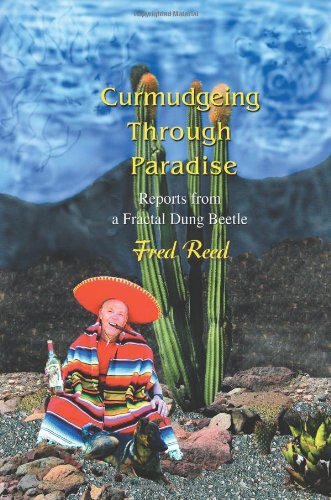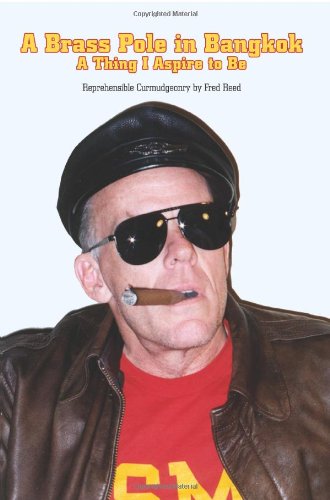It may have been the summer of ’85, or may not have been, when I hitchhiked out of Washington, DC, which is the left ventricle of the heart of darkness, toward the coal fields of West Virginia. I was then on the low end of respectability, as I hope I still am. As a veteran of the long-haul thumb in the Sixties, hitchhiking seemed a reasonable way to travel.
As the sun dropped low the land grew rumpled and stood on edge, green and forever with the blue undercast of the mountains. I saw a man with a lawnmower on a rope, which he paid out to mow a front lawn sloping at a steep angle. He’d pull it back up, step sideways, and let it roll back down for another swath. West Virginia is a whole ‘nuther place, with respect to anywhere.
Deep in the mountains we pulled into Bluefield, where I was born. I forget who “we” was. A hitchhiker’s memories are made of snapshots, visions, anecdotes, and oddballs, none associated with time or each other. Bluefield was poor and bedraggled, a city more at home in the Forties that had never quite left them. Coal dust lay over wooden houses, or maybe it was just the ghost of coal dust past. For someone who didn’t like the modern world, it felt right.
 Curmudgeing Through Pa...
Best Price: $2.50
Buy New $17.73
(as of 01:45 UTC - Details)
Curmudgeing Through Pa...
Best Price: $2.50
Buy New $17.73
(as of 01:45 UTC - Details)
I found the hotel. It was old, old and plain, and maybe it didn’t really smell of coal. It didn’t belong to a chain. I checked in and walked to a bar nearby, where a couple of men in work clothes were drinking: tall, gaunt, angular, with the facial planes of the Scots-Irish. They reminded me of crab fishermen on the Potomac when I was a kid.
We talked. They were with the railroad. I told them I’d come into the world in Bluefield and gone with my mother back up the holler from North Fork to Crumpler. She was living with her father, the coal camp doctor, while my father killed Japanese in the Pacific.
They accepted the foregoing as credentials. We got along. Their job was inspecting the railroad tracks for cracks, which they did with a magnetometer aboard a caboose, in which they lived for long stretches. That caboose was home for them. It sounded like a pretty good life to me, better than being another sorry-ass lawyer in the cubicle orchards of Washington. The city is like a damn crossword puzzle, with little squares you fill in with people.
 Nekkid In Austin: Drop...
Best Price: $3.99
Buy New $14.95
(as of 01:20 UTC - Details)
Nekkid In Austin: Drop...
Best Price: $3.99
Buy New $14.95
(as of 01:20 UTC - Details)
They asked if I would like to join them in the caboose for some serious drinking. I calculated the angular dispersion from the rails back to the hotel, figured I’d probably make it, and said hell yes.
The tracks lay in gray industrial tundra, smelling of coal and the creosote of the ties, the caboose rust-red and soot grimy and showing the dents and abrasions of a hard life. I decided I wanted a caboose. Maybe I’m attracted to trains because as a wee kid of four I watched the big steam locomotives pull out of Crumpler with loads of coal chuff…a…chufa…a…chuffachuffa. I can never hear a train whistle at night, sad and mournful as a lost dog, without wanting to climb aboard.
For hours we drank raw vodka and they told me train stories. The blue-collar and the crazy can tell stories because they have lived them in wild variety. Having spent time in truck stops at three in the morning with a dozen eighteen-wheelers brooding outside, with cops and commercial fishermen, I conclude that a misspent life is the only well-spent variety.
A natural camaraderie exists among people who work for a living and don’t have much. I didn’t exactly work, but I had grown up around people who did, and knew how to fit in. It wasn’t surprising that they offered to share their vodka with a stranger. Talk to anyone who has hitchhiked extensively. He will tell you that the likelihood that a car will stop is inversely proportional to the price of the car. People who have needed help are inclined to provide help.
They talked of the diners and beer sluices, the miners with black lung and the waitresses in the diners and diabetic retired railroaders common in an obese state. Yeah, they said, the doctors had to cut Suzie’s feet off, diabetes does that, and she died not long after.
 A Brass Pole in Bangko...
Best Price: $3.94
Buy New $18.80
(as of 01:20 UTC - Details)
A Brass Pole in Bangko...
Best Price: $3.94
Buy New $18.80
(as of 01:20 UTC - Details)
They weren’t unhappy. They drank because they liked to drink, not because of despair. They made enough to feed their families and pay for beer, and they liked to watch football and sit on the porch. Desperate consumption never occurred to them. Not having the money to engage in the competitive purchase of things they didn’t need, they lived with what they had. Vacations to Europe? An idea from another world.
And they told a common tale. They had been born in the mountains, and pretty much stayed there, depending on where the caboose got sent. But nowadays, they said (remember, this was mid-Eighties) most kids left. West Virginia didn’t have anything the young wanted. They went to Dee-troit to make cars, or went into the military. The old folks stayed, lived as best they could on Social Security until they died.
Content with enough: A radical mindset, I guess. The crab fisherman I mentioned — they didn’t have much, nor certainly were they in want, but…They had the self-respect that comes of being a big kid who could take care of himself. They built their own lapstrake crab boats, converted junked car engines to marine, made the crab pots, pulled them, sold the crabs to Popes Creek, changed their own oil, built their porches, and wired their own houses. They were grown-ups.
In Washington nobody can change a flat tire, and they spend long days working on lawsuits between rival parking-lot companies. I’ll go with the caboose.
Even in the Eighties, West Virginia was changing, whether for good or bad I don’t know. Malls came. Some say that Walmart is a good thing because people can buy cheap power drills. Perhaps so. They certainly buy them. The price is that the state would soon look like every other state, all shopping centers and chain stores. America was becoming, has become, a nation of homogeneous consumers with tastes designed at corporate. This is progress, say some. Perhaps. I could do without it.
But this is rambling. I got back to the hotel. I never saw the men again.




